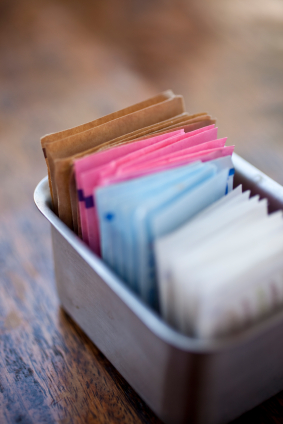The Scary Truth about Artificial Sweeteners
You’ll find them in just about everything — from succulent candy to sweetened medicines. People dump them in coffee, tea, cereal, smoothies, and anything else that doesn’t satisfy their sweet-tooth craving. They are known by names such as Splenda®, Equal®, and NutraSweet®.
Because these sweeteners have widespread acceptance, few people think that they could actually be detrimental to one’s health. Isn’t Diet Coke supposed to be good for you? Beyond their calorie-free appeal, however, lurks some concerning evidence that sugar substitutes are not at all good for your health.
Sucralose
Found in: Splenda®, some varieties of sugarless chewing gum, light yogurt, syrup, canned fruit, and ice cream
Sucralose is sweet, to be sure, but probably not to your body. Sucralose is manufactured by means of a chlorinating process. Chlorine is toxic, and some even claim that it is a carcinogen. Whatever the case, the vestiges of chlorine in your cheery yellow Splenda packet are not safe. Side effects of sucralose are headaches, abdominal cramping, weight gain, mood alteration, fatigue, and insomnia.
Saccharin
Found in: Sweet ‘N Low®, Sugar Twin®, some low-fat ice creams and baked goods
Before 2000, products containing saccharine were required to carry this warning: “Use of this product may be hazardous to your health. This product contains saccharin, which has been determined to cause cancer in laboratory animals.” The labeling was repealed due to inconclusive retesting. The fact that the evidence is “inconclusive” means that scientists still aren’t sure about its effects on humans. Tenuous links have been drawn between saccharine and bladder cancer. Plus, with reports of headaches, skin irritation, respiratory problems, digestive discomfort, and even muscle dysfunction, saccharin is still suspect.
[stextbox id=”custom-2″ float=”true” align=”right” width=”300″]“Does this mean the end of all of life’s sweetness? Thankfully, no. Too much sugar is bad for you. That’s a given. Limited amounts of sugar, however, are fine. And for those days when you have to satisfy a sweet tooth, there is another option: Stevia.”[/stextbox]
Aspartame
Found in: Equal®, NutraSweet®, Diet Coke, Diet Pepsi, other diet drinks
Perhaps the most popular, yet hotly debated, sweetener on the market today is aspartame, found in those little blue packs of Equal® or in NutraSweet®. The safety of this sweetener is under serious investigation. Through hydrolysis, aspartame may produce methanol or wood alcohol, known to be highly toxic to humans. Methanol metabolizes within the body into the harmful compound, formaldehyde. Maybe you’ve heard of it? Phenylalanine, another component of aspartame, becomes a neurotoxin in the presence of certain of the body’s amino acids. Pouring aspartame into your tea seems a big risk for a slightly sweeter drink.
Acesulfame potassium
Found in: Sweet One®, Swiss Sweet®, Sunett®, some fruit preserves, juices, pharmaceuticals, and toothpaste
This sweetener has been found to prompt insulin secretion, and as a result, hypoglycemia. Critics also claim that acesfulfame potassium is carcinogenic, due to the fact that tested lab animals developed lung tumors, breast tumors, leukemia, and chronic respiratory disease. In spite of its “approval” by the powers that be, its risk-free health effects are dubious at best.
Besides the harmful side effects in the ingredients of artificial sweeteners themselves, there is another downer. Artificial sweeteners cause the body to crave more sweetness. As a result, people are more likely to eat greater amounts of sweet food, leading to either unhealthy levels of sugar or artificial sweetener.
Does this mean the end of all of life’s sweetness? Thankfully, no. Too much sugar is bad for you. That’s a given. Limited amounts of sugar, however, are fine. And for those days when you have to satisfy a sweet tooth, there is another option: Stevia.
My Choice: Stevia
Found in: SweetLeaf, Truvia, PureVia, NuNaturals
My choice for substitute sweetener is stevia. Stevia is a plant-based natural product that has no calories and none of the negative side effects. Studies even suggest it helps with the stabilization and clearance of blood sugar after a meal. Brands such as Truvia sell the granular form. Liquid droppers, like SweetLeaf’s, are perfect for making a treat of your favorite tea.
Let’s face it. Life’s a little better with some sweetness now and then. I’ve found that Stevia is a guilt-free, risk-free, and delicious way to get it.
[table id=4 /]









Kathy,
What about when they find the “side effects” of Stevia? You know, there’s bound to be something wrong with it, right? Next question, what about the effects of white sugar on blood sugar? For hypoglycemics, would Sugar In The Raw be better than white sugar?
Thanks,
Kathy
Hi Kathy,
How about agave nectar?
Thanks,
E
The problem with agave nectar is that it is a high fructose sugar which “…can only be metabolized by the liver, so the amount of toxic byproducts produced is disproportionately high compared to higher glucose content sugars. In addition, high fructose consumption can drastically decrease leptin (the hunger hormone) sensitivity, so your appetite increases.” (source: http://www.thepaleomom.com/2012/03/is-sugar-paleo.html)
I was loving Truvia until I started hearing about how it’s ultra-processed. Now I’m not sure what to think! http://www.brucebradley.com/food/truvia-honestly-sweet-or-dishonestly-marketed/
Still looking for answers. I do think aspartame is bad for you but dang, diet soda sure tastes good 🙁